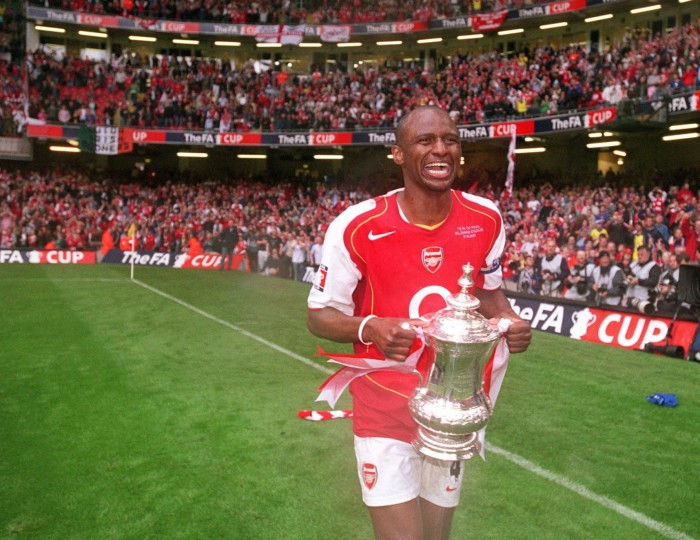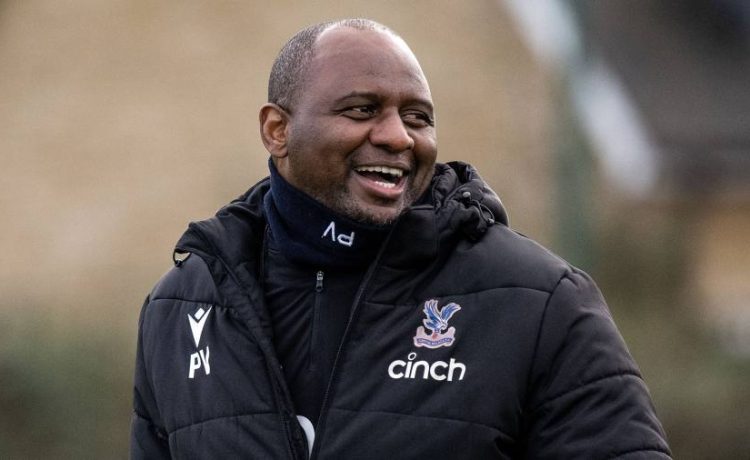Patrick Vieira does not want to talk about the past. Since hanging up his boots after a hugely successful playing career, and making the difficult transition to football management, he is prepared to be judged all over again.
“Who I am as a manager doesn’t reflect who I was as a player. I never talk about who I was as a player”, he said. “What’s important for me is to be judged by what I’m doing with the field, and managing to get the best of the players I have.”
Vieira is now manager of Premier League team Crystal Palace, and one of the very few black coaches in top level football.
He had a strong first season at the London club, finishing 12th while overhauling the squad, but this season is proving less straightforward. His team are on a 10-game winless streak and have failed to register a shot on target in the past three matches, a gloomy Premier League record. Although still 12th, his side are just five points off the bottom of the league, with two tough away matches coming up.
“It’s much easier to play football than to be a manager,” Vieira told the Financial Times at the Business of Football Summit. “You win or you lose, you go home — you take it [on] yourself and it’s over,” he said. “But as a manager, when . . . the team doesn’t perform the way you want . . . you watch the game again, you get frustrated, you try to get the answer. And it’s not always easy to find.”
During his years at Arsenal, under the direction of French coach Arsène Wenger, the towering midfielder lifted the Premier League trophy three times, and won four FA Cups. Vieira went on to Inter Milan, where he secured three Serie A titles in a row with two star managers — Roberto Mancini and José Mourinho. His international career with France brought winners medals at the World Cup and the European Championships.
As retirement loomed, Vieira had given little thought to his future. But those around him at Manchester City — his final club as a player — saw the value in keeping him in the game, and bringing his wealth of experience to bear in a different capacity.
Brian Marwood, the ex-Arsenal player turned senior executive at City’s parent company, convinced him to do his coaching qualifications, then offered him the chance to manage one of the club’s youth teams. After discovering his love for the job, Vieira moved to the US in 2016 to take charge of City’s sister club, New York FC.
“I didn’t want to be a manager based on the career that I had. I wanted people to make a judgment on me as a manager, and so it was important to build myself, to have this kind of credibility [and] experience to be where I am today,” he said.

Even for football players with years of experience as team captains, the transition to taking charge can be difficult. A handful of Vieira’s contemporaries have made the jump into Premier League management, but the results have been mixed. Mikel Arteta has taken Arsenal to the top of the Premier League table but Steven Gerrard and Frank Lampard were both sacked earlier this season from Aston Villa and Everton respectively after a run of poor results. Vieira himself was sacked by French side Nice in late 2020 after the team was knocked out of the Europa League.
For players aspiring to manage, Vieira said a fundamental change of mindset was needed. While players can focus solely on themselves, head coaches must always “put themselves last”.
“I think if you want to be a really good manager, of course there are the basics of organisation, of having a clear philosophy of how you want to play the game; it’s about the work ethic,” he said. “But it’s [also] about thinking about other people before thinking about yourself. And if you manage to do that then you have a good chance.”
As a player Vieira had a reputation for being strong — both physically and mentally — and never shirked from a challenge. His temperament has mellowed with age. In person he is approachable, calm and curious about the world outside football.
“You absorb the pressure from everybody around you, around the football club. And when things are not going in the right way, there is this kind of negativity that you have to manage, that you have to control,” he said. “It’s not easy, but that is part of the job and I love it.”
As the only black manager in the Premier League and one of just five across English football’s top four divisions, Vieira is something of a statistical anomaly. According to data from the Black Footballers Partnership, only 4.4 per cent of those in managerial roles typically filled by ex-players in England’s top four divisions are black, compared with 43 per cent of players in the Premier League. The numbers are even more stark at the club executive and ownership level, with just 1.6 per cent of positions taken by black ex-players. Vieira finds the figures “disturbing”, and has become a vocal proponent of change.
“There is a lack of opportunity, there is a lack of trust, there is a lack of confidence. I heard so many excuses like black ex-players don’t want to do their [coaching] badges, but it is not true,” he said. Indeed, BFP figures show that almost a quarter of those training for their professional coaching licences between 2004-20 were black, but few were finding their way into high-level jobs.
“Those opportunities are not there,” Vieira said. “Those doors are not open. And when the doors are not open and the opportunities are not there, it’s difficult for you to show your passion and show how good you can be.”
To effect change, the former French international believes black managers, coaches and executives need to recognise the power of networks, and work together to build better connections across the game.
“Nowadays, to get a job you need to know someone, you need an agent who can put your name on the table”, he said. “I think we — as black managers — have to build ourselves a better network to allow ourselves to be on the table when owners have to make a decision.”
Vincent Kompany, a young black manager and former Premier League champion, is on track to reach the Premier League this summer. The Burnley manager, an ex-teammate of Vieira’s at City, is on course for promotion after guiding his side to the top of the Championship, English football’s second tier. At just 36, he would be one of the youngest managers to lead a Premier League team.
Vieira believes such “positive examples” are vital if black players are to make the switch after retirement, not just to coaching but also to senior executive positions within football, such as a chief executive or sporting director.
“I think you always need a role model when you’re growing up, and if we can be good role models for those young players that will be really good,” he said. “It’s important for us to make them understand that staying in the game and doing what you love can be something really exciting for the future. We have to open their minds.”





